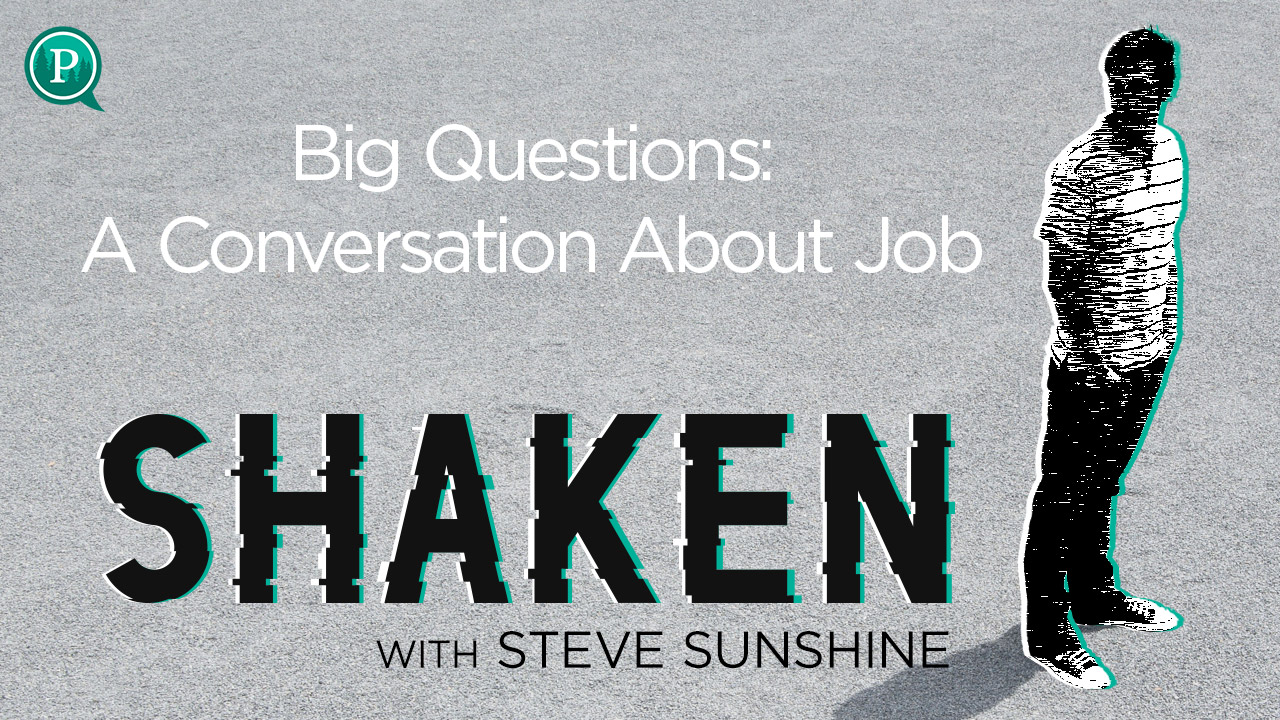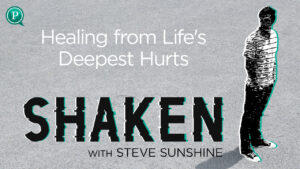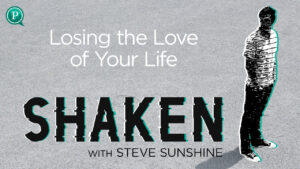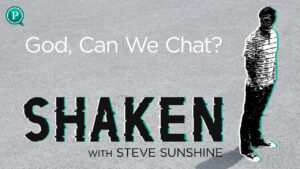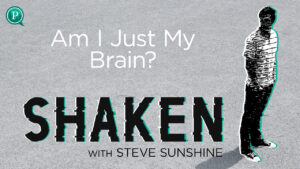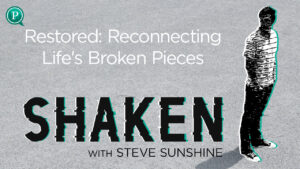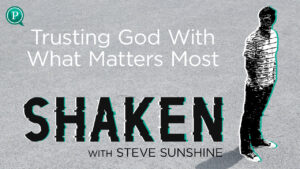Steve talks with Evan Westerfield who has written a book about what for many is one of the most perplexing books in the Bible: Job. Evan and Steve what we can learn from Job’s difficult story. Plus, Steve shares how God pulled him out of the deepest pit he’s been in since being diagnosed with Parkinson’s Disease. Evan is a pastor at The Grove Church in Marysville, WA.
Show Notes:
Book: Suffering and Silence: Job’s Struggle, God’s Voice, and Our Response
Transcription:
Steve Sunshine:
We live in a time of unprecedented comfort. We value safety and security, and maybe that’s why it’s so easy for us to be shaken, when the straight road we’re on takes a sudden curve and seems to be pointing us in a direction we don’t want to go. Welcome to the Shaken podcast. I’m Steve Sunshine. Your confidence, your mood, your perspective, even your faith may be shaken because of something that’s happened in your life. Jesus told us we’d have trouble in this world, so we’re shaken, but not surprised. He also said, “Take heart. I have overcome the world.” In this podcast, you’ll hear honest conversations with people who have or are going through life altering hard times and have found that God was with them in the midst of it all.
To say my life has changed since I was diagnosed with Parkinson’s disease would be an understatement. We think it was the medicine I was on at the time, but I started having severe lapses in focus and concentration. Those things affected my ability to do work I’ve done for decades. Other things piled on. My mom was dying. Our youngest was heading out into the world on his own, and I was losing the ability to cope.
I don’t know if it was the disease, the medicine or the enemy getting a foothold or some weird combination of those things. But I wandered into a dark place. I felt like I had failed God and he had left me. I remember feeling like I wanted to pull my own skin off. But God hadn’t left me at all. He led me to the story of the Apostle Paul and the thorn in his side. Three times, Paul asked God to remove it. God said, “No.” He said, “My grace is sufficient for you. My strength is made perfect in weakness. Your grace is sufficient. Your grace is sufficient.” “Your strength is made perfect in my weakness.” I kept repeating those things. And by doing so, I drew near to God, and he drew near to me and he pulled me out of the pit.
On this episode, we’re talking about the character in the Bible who is most associated with suffering, Job. My guest this time is Evan Westerfield. He’s with the Grove Church in Marysville, Washington. And he’s just written a book called Suffering and Silence: Job’s Struggle, God’s Voice, and Our Response. Evan, it’s a perfect subject for this podcast. Thank you for joining us.
Evan Westerfield:
Thank you for having me.
Steve Sunshine:
Absolutely. So first of all, to start from the beginning, what made you decide to write this particular book?
Evan Westerfield:
Yeah. So a pastor, friend and I, we do a podcast where we go through the Bible every year. And I remember there was one year where I just read through Job and I read through an outline of how it goes. And I don’t know if you’ve had this situation happen, when you read the Bible, but sometimes something just clicks. And so I read through it and it was as if … Because I had read through the whole Bible probably a few times before that moment. But then all of a sudden it was like I was reading it for the first time and I couldn’t seem to get it out of my head. And so it led to a discipleship group class that I taught and then it eventually made its way into this book. So it’s a walk through the Book of Job. And hopefully for anyone who’s ever read it and been a little bit confused by the different things that are going on, it’s a helpful resource.
Steve Sunshine:
I like your writing style a lot. It’s very readable. People should know that because sometimes books on the Old Testament can be a little bit intimidating, but it’s very approachable. I think you did a great job and-
Evan Westerfield:
Well, thank you.
Steve Sunshine:
It literally will take you through … There’ll be a writeup on a section of the book and then you’ll say, “Read Hob chapter this through verse that.” And then … So you can do it as a Bible study or just read it as a book. But the reason we wanted to have you on was to talk about this whole thought of suffering. We’ll start with the 10,000-foot view, the main takeaway. Do you think if you had to sum it up from Job, in terms of if you’re talking to somebody who’s really going through a hard time in life right now.
Evan Westerfield:
Man, that’s a hard one. It’s almost two separate questions. I think if you asked me what is the number one takeaway from the Book of Job, I would say it’s I’m not God. And that’s not necessarily the most comforting thing to tell someone who’s walking through suffering. But I think what’s interesting with the book is the ending comes out of nowhere. And I think a lot of us know the ending, and so it doesn’t feel that way. But throughout the book, Job is suffering. He’s going through exceptionally painful suffering that most of us will never even dream of walking through, and he doesn’t understand why. And the entire book is … I shouldn’t say the entire book, but a very large portion of the book, is Job fantasizing about standing before God and getting answers as to why these things have happened to him. And he’s going to his friends for comfort in the midst of this and they’re not providing any comfort back to him.
It seems like everything’s fallen apart around him. And then at the end of the book, God actually does speak to Job. And yet, once God speaks, all he does is ask him questions. And the questions are … It begins with, “Where were you when I created the universe?” And the inference there or the implication there is that God is asking Job, “If you are willing to question the way that I’m running the universe, surely you must be greater than just one man.” And as the conversation with God continues to go, and eventually he works his way through all of nature, and it culminates as he talks about these two great beasts, behemoth and Leviathan, it ends with Job not getting any answers to the questions that he was asking. And yet, Job repents of what he said throughout the rest of the book.
Steve Sunshine:
There’s something in there about suffering well, I think.
Evan Westerfield:
Yes.
Steve Sunshine:
Not perfectly, because Job has his moments and he goes through a lot. If you’ve never read the book, it’s pretty extreme. But he says, “The Lord gives and the Lord takes away. Blessed be the name of the Lord.” I’ve maybe said that more because of the Matt Redman song. But it comes from Job. And I know that that’s a strengthening thing, if you’re going through something difficult. And rather than think of God as that great vending machine in the sky, you’re able to say, “No, Lord, I can be content in all circumstances. Blessed be the name of the Lord.” It’s hard, but it’s very freeing I think.
Evan Westerfield:
Yeah, I think it’s often when … And this is something I get into in the book. I think one of the statements that I think is a really unhealthy way of looking at it is we ask ourselves why do bad things happen to good people? And I think both of those qualifiers are wrong, because I think the right question to ask is why do the righteous walk through pain or why do the righteous have painful things happen to them? Because that is actually what happens. When we say good, famously, we’re not good, we’re not perfect. That’s the point of why Jesus came. And so all of us have sin and we’ve all fallen short of the glory of God. And at the same time, there’s … One of the friends talks to Job later on in the book, his name’s Eliahu. And he’s different from the other friends.
I think he’s actually right about most of what he says. But he reframes Job’s questions because the entirety of the book up until then, Job believes that his suffering is unjust because he has lived a righteous life. And his friends believe that his suffering is just because Job is a secret sinner and they’re trying to expose some kind of secret sin that he has. And then Eliahu comes in and just asks Job, “What could God be communicating with you through this, to you through this? What could God be saying to you in the midst of suffering?” And as I was reading, I remember reading a story about a young man who is diagnosed with leukemia, and he was talking about how before he had his cancer, he never took his faith seriously. And then afterward, his relationship with God was as close as it had ever been. And he actually said something to the effect of, “I wouldn’t trade it because what does it profit a man to gain the whole world and lose his soul?”
Steve Sunshine:
It’s in a subversive kind of way, almost a gift. You mentioned why do good things or bad things happen to good people? That phrase comes from a book that was written in the 80s by a rabbi who was honestly wrestling with that question. And he came up with, I would say, with all humility, the wrong answer, which was that God is all good, but he’s not all powerful and there are some things he can’t control. But as Christians, one of the difficult things about being a Christian is holding things that appear to be contradictory intention, because God is more complicated than we are. So God is all good, he is all powerful. He could prevent anything bad from happening to us. He doesn’t because the world has fallen, but he will. We have that hope. And so things will be made right. Maybe now, sometimes that happens, maybe later, or maybe in the life to come.’.
Evan Westerfield:
I think God creates all of us, with a longing for the new heaven and the new Earth in our hearts already. We have a longing for eternity that’s there. And sometimes, we let our desire for that wreck our relationship with God, because we’re so angry that that’s not where we’re at right now. And there’s a famous quote … I can’t remember if it’s one of those ones that’s attributed to Martin Luther because we just don’t know who said it or if it’s one of the ones he actually said. I feel like that happens a lot.
Steve Sunshine:
I wasn’t there.
Evan Westerfield:
There you go, sure. But if he talks about existing in this idea of already but not yet, and so many of the promises of our salvation are right now. Right now, we have relationship with God in a way that we wouldn’t have if Jesus did not do what he did. Right now, we have a hope of forgiveness of sin, that we have because of what Jesus didn’t do. But at the same time, there’s things that we don’t have yet. We don’t have that perfect relationship with God, that only comes on the other side of eternity. We don’t have the new heavens and the new Earth that we get to spend eternity with God. So there are things that come after. And that’s why I think Revelation 21 is such an important chapter that we … I shouldn’t say we never talk about. But it goes under talked about in some Christian circles, I think.
I think possibly the most beautiful line in the entire Bible, and it’s repeated a few times, but it’s that, “They will be his people and he will be their God.” And that’s really the promise. And in Revelation 21, it talks about, “He will wipe away every tear, all of these former things will pass away.” And then it culminates in this idea and they will be his people and God himself will be with them as their God. And that’s what we look forward to. And it’s also a recognition that that’s not what we get yet.
That we live in a broken and sinful world and we live in a world with pain. We live in a world where suffering happens. And I would agree with you. It’s not that God is all powerful but … I believe that God is all powerful. God can do whatever it is that he wants. And I think the lesson of Job, and this is where it gets uncomfortable because I think the book has answers. I think just a lot of times, we don’t want to hear what those answers are. I think one of the lessons of Job is that we are not God and we don’t get to tell him how to run the universe. And there’s things that God does that don’t make any sense to us, and we have to be okay with that.
Steve Sunshine:
Maybe that’s always been hard. It seems like that’s especially hard in the moment in history that we’re in now, with what our culture says about being in control of your own destiny and how we’ve gained all this knowledge. But we can’t understand that. And I think that’s a tough pill for a lot of people to swallow. But it’s part of being submitted to a God who’s infinitely greater than we are. So shifting gears a little bit, this book, Job, is a clinic on how not to talk to a friend who’s having a hard time. So we’ve got these three guys who start out well. They start out listening and being silent, which virtually everybody says is the right thing to do. Tell us what lessons we can learn from these three guys.
Evan Westerfield:
I think one of the, and you alluded to it, scariest things about the friends is that they are good friends and they have good intentions. And I think sometimes, the way that we preach the Book of Job is that they just come in and they’re wanting to make Job’s life a living hell right off of the bat. But no, like you said, they sit with him in silence for a week. For seven full days, they just sit with their friend and they mourn with their friend. And when you read the speeches of Eliphaz, when he starts off, he’s the first friend who speaks. And he even tells Job, “You’ve gone your whole life and you’re helping people and you’re walking them through with wisdom. And now, it’s time for us to do that for you.” So that’s clearly what they think is happening.
They’re trying to give Job the same wise advice that he’s given other people, and then they just fail miserably at what that means. I think … And each of the friends have a little bit of a different lesson that you can learn from them. With Eliphaz, I call him the good man who is wrong. And by that, I mean he really did seem to have Job’s best intentions at heart.He really did seem to try and help Job. And yet, he did wicked evil to his friend through all of that.
And so with Eliphaz, I think the big lesson to learn is to be willing to listen. I think a big lesson with Eliphaz is we can go in with the best of intentions. And yet at the same time, if we’re not listening to what our friends say, if we’re not loving them well, if we’re so convinced that we’re right, that we’re not willing to offer any comfort in that sense, I think all of a sudden, it’s a great reminder that the road to hell is paved with good intentions. And Eliphaz unwittingly commits intense evil against his friend, even as he’s trying to do good.
Steve Sunshine:
It seems like a lot of us are not comfortable with silence. And then we feel like we need to say something. And so we say something reassuring we think is reassuring or encouraging. And maybe it comes off as trite or like a bumper sticker saying or somehow insensitive. On the other hand, I’ve had situations where I’ve been silent and my wife wants me to say something. That’s really a whole different podcast.
Evan Westerfield:
That’s fair. I had to learn the opposite lesson where when I first got married, it was sometimes, “I don’t want you to fix things, I just want you to listen to what I have to say.”
Steve Sunshine:
Exactly.
Evan Westerfield:
It’s my bad.
Steve Sunshine:
But then other times it’s like, “No, I actually want you to fix this.” But we digress. We have the other two guys. One of them is I guess appealing to history and tradition and the way things have been.
Evan Westerfield:
Yeah, so Bildad is the second friend who speaks, and I call him the smart man who lacked wisdom. And as you read through the book, you see that all of the different friends have, their characters are different. And so with Bildad, his really weird thing is that he seems to be into plants like in botany, because a lot of the metaphors that he uses are about that. But his other thing is that he’s appealing to the wisdom of the ages. And so with Eliphaz, he talks about how he’s had visions and he’s appealing to something a little bit more modern. Bildad seems to say that all of our fathers have wrestled through these questions. The answers that they have are fine. And he leaves no room for anything else that could happen. And so for us today, I think it is just a reminder to, again, not be so rigid with some of these things.
I think there’s a lot of things that we believe that aren’t even biblical. They’re just tradition, and we don’t realize that that’s the case. There’s an author I like named Andrew Klavan, and he uses the analogy of a theological barnacle. And the way he talks about it is it’s like if our faith is a ship and over time, there’s barnacles that get onto the bottom of the hole. And if you don’t do the hard work of scraping the barnacles off and repairing it, eventually, it’ll destroy the whole thing. But what’s scary about the barnacles, you don’t even realize they’re getting put on. You can just be … You’re just sailing. And it’s not like you’re going through the sea and all of a sudden you’re like, “Oh, barnacles. No!”, and then they’re all getting a fix. It’s slowly over time, without you even noticing, the ship picks up barnacles.
And I think slowly over time, without us even noticing, we slowly think of things as being a core tenant of our faith, that we’re never there to begin with. Jesus famously deals with the Pharisees. So many of their laws and traditions, they were things that they held to, they had been around for a few hundred years, but they weren’t actually written in the law. And so they were chastising the people of Israel for not keeping those rules, even though it’s not even something that they were held to. I think a really easy one that a lot of people fall into is that Satan rules hell. That God created hell, and it’s Satan’s kingdom and he gets to live there. And that’s Dante, that’s Tom and Jerry to a certain extent. But that’s not the Bible. The Bible is that no, hell is just as much God’s domain as anywhere else in the universe.
God rules hell, God rules everything. God rules overall. And yet, little ideas like that can make their way in. And so I think when we’re talking with people who are walking through suffering, it’s not being so confident in that wisdom of the past, not being so confident in tradition, that we forget to love people well, and instead we just walk those things.
And that’s the lesson really of all the friends. Zophar is the last friend, and I call him the angry man who knew he was right. And his thing is really … And this is me reading between the lines. I think he was just so obsessed with being right that he didn’t care what else happened. And Zophar has some of the most vitriolic things to say to Job. And he, from the start, Eliphaz starts off really soft. Bildad to a certain extent, starts off a little softer as well. Zophar is just at 10 from the start, and he doesn’t let off the pedal any of the way through. And I think for me, Zophar is one of the more convicting characters because I was just thinking, “How many times in my life have I said hurtful things, just because I want to win an argument? How many times in my life have I not loved well, because I was more concerned about being right than I was about loving the other person?”
Steve Sunshine:
Yeah. And one of the things that these guys bring up is, “Job, you must’ve done something wrong.” And so sometimes when somebody goes through a loss, whether it’s a health thing or a divorce or a job loss or loss of a dream, they may get angry with God. Sometimes, however, they get angry with themselves. And it’s like, “God, I must have done something wrong. I must have done something to deserve this.” And setting aside the fact that none of us deserve salvation … And Jesus makes it clear with the story of the blind man who was blind from birth that it wasn’t his sin or his parents’ sin. Maybe we could talk a little bit about … Because I think this would be a relief for some people. It wasn’t you. If you’re sick, it’s not something that you did.
Evan Westerfield:
Yeah, I think in the story of Jesus, and I can’t remember … He was blind, in the story of Jesus and the blind man. What’s really interesting about that is he says yeah, it’s not for his sin or his parents and that he was born blind, but it was for the glory of God. And what that is saying is that that man was born blind so that Jesus could heal him, and so that people would come to know Christ through his suffering. And it’s easy to be very flippant with that. Because a man born blind, we don’t know how old he was. But for decades of his life, he struggled. He couldn’t work.
His life would’ve been incredibly difficult. And in that passage, what Jesus is saying is the reason that this happened is so that he could glorify God, so that God would be glorified through him. I think a healthy question to ask ourselves, as we walk through suffering, instead of, “Why is this happening to me?”, is, “How can God be glorified through this?” And some of the most loving people that I know, some of the people in the church who just are able to love people exceptionally well, it’s because they’ve walked through exceptional pain. And in those moments, God is using the suffering that they walk through, god is using the pain that they walk through in order to reveal himself to others. And I think as Christians, that’s the number one goal of our life, is how can I bring God glory? How can I reveal Christ to people in a brand new way?
And I think that in our modern world, we’re so quick to call any sort of suffering evil or any sort of suffering bad, instead of thinking about what God could be doing in the midst of it. And part of that is just we live in a really blessed time. For most of human history today … Like today, me and my wife just had our first child.
Steve Sunshine:
Congratulations.
Evan Westerfield:
Thank you. I have every expectation of being able to watch him grow up and not have to bury my son. For most of human history, that was not the case. For most of human history, walking through the death of a child was an incredibly common thing that almost every family had to go through. For most of human history, the idea of living to when your hair was gray was … If it happens, that’s great, but for the vast majority of people, that’s not the way it’s going to go down. For most of human history, death was around the corner. For most of human history, as a man, you could be called on to go fight for a war for your futile Lord and go die for land that you don’t actually own or possess.
And so we live in this really beautiful moment of time where we live a long time. We can reasonably expect health. We can reasonably expect for all of our friends to live long with us. And I think it’s taken our mind off of the end, where we don’t reflect on what the end looks like anymore. Even with worship music, I’ve noticed that if you go back to the old hymns, almost all of them include a verse about what going into eternity looks like and reflecting on death and reflecting on ending well. And today I think, we don’t think about that very often.
It’s funny because I had a moment where … Like I said, my son was born a few months ago. And so I had this epiphany of, “If I die tomorrow, what’s going to happen?” And so I had to go like, “I got to go get life insurance. I got to go make sure all of his money stuff is set up for the future.” And it was a convicting moment for me because I realized I had been living most of my life up until then without really having the end in mind. I’d been living most of my life with just, “Ah, whatever happens, happens.” And now that there’s a child that I need to make sure is taken care of, all of a sudden, I’m more reflective on the end in that way as well.
Steve Sunshine:
We were talking about glorifying God through suffering. And that’s something I hope the listener hears that the way it’s intended. It doesn’t mean, “Soldier on. This is not painful. Just go do it.” You need community, you need comfort, you need friends, you need good friends. They will make mistakes. And I think that’s one of the lessons of Job. But people who care about you and it’s okay to be hurting, God knows you’re hurting. But there is an opportunity that you have through suffering that you would not have had otherwise. And if you can get yourself there mentally, it’s actually exciting, that you can be the reason that God is glorified.
Evan Westerfield:
Absolutely. I think one of the aspects of Job that we don’t talk about is when you get to the epilogue of the whole story, Job forgives his friends and he offers sacrifices on behalf of them, and then God restores him and he is blessed once again. But there’s the interesting line in Job 42:11. And it says, “All his brothers and sisters and everyone who had known him before came and ate with him at his house. They comforted him and consoled him over all the trouble the Lord had brought on him. And each one gave him a piece of silver and a gold ring.” And what that says is that … Like you said, job had to grieve and there was nothing wrong with that. Job was, in the end … It’s not that God magically took away his grief and magically took away his suffering. In the end though, his friends surround him and Job is able to grieve in a healthy way.
So I think that’s a great point, that glorifying God in the midst of suffering does not mean pretending that you’re not hurting. It doesn’t mean pretending that everything’s great. It doesn’t mean pretending that … Even that you wish that things were different, I think what it looks like is trying to keep perspective as much as possible, and trying to look at how can I help others? How can I help people walk through this? Maybe on the other side of it? How do I continuously run to God? How do I continuously bring things to God even when I feel angry at him, which Job does throughout the book. Job is very angry with God for the vast majority of the book. And yet, he continuously cries out to him. Some of the most famous lines are in the middle of speeches where Job is talking about how angry he is with God.
“Though he slay me, yet what I serve him”, is in the midst of a very dark speech of Job. “I know that my Redeemer lives”, is in the middle of a speech where Job is talking about how he’s ready to die and he’s ready just to be done with everything. No, I think it’s incredibly important. That just because we’re looking at how can God be glorified in the midst of suffering and asking ourselves, “How can we suffer well?”, that doesn’t mean pretending that the pain’s not there. And it doesn’t mean not running to people. It doesn’t mean not seeking comfort from friends and family as well.
Steve Sunshine:
Very good. Evan, thank you so much for joining us. Evan Westerfield has written a book called Suffering and Silence: Job’s Struggle, God’s Voice, and Our Response. If you’ve never read the Book of Job and you want something that feels raw and authentic, this is it. We’ll read Job and then Ecclesiastes. That’s another conversation. But where can we find this book?
Evan Westerfield:
It’s available on Amazon, Barnes and Noble as well. I think you have to type in my name to get it on Barnes, though. Amazon’s probably the easiest way to find it.
Steve Sunshine:
Okay, so Suffering In Silence. We’ll put it in the show notes. And you’ve got a podcast as well. I’d love to know a little bit about that.
Evan Westerfield:
Yeah. Me and another pastor named Aaron at The Grove, we do a podcast every week called Let’s Read the Bible. We go through the Bible reading plan that we do as a church, and we invite people to follow along, and we just talk about every week’s readings, what we learned, diving a little bit deeper as much as possible. And it’s been fun. It started off as something that we were just doing for our church, and that’s where it was the first couple years. And then as time has gone on, it’s really grown. We have pocket … Because you can see the data on the backend, so we have pockets of people in California and Texas and all of these different places where they’re listening along. So it’s been really fun.
Steve Sunshine:
Well, let’s get some more people over there and check it out.
Evan Westerfield:
There you go.
Steve Sunshine:
It’s available on any podcast app, I assume.
Evan Westerfield:
Yes. Yep.
Steve Sunshine:
Excellent. Evan Westerfield, thank you so much for joining us, and congratulations on the book.
Evan Westerfield:
Thank you so much. Yeah, thanks for having me. It’s been a real blast.
Steve Sunshine:
Thank you for joining us, and we’d like to see as many people encouraged as possible. And you can help by liking, sharing, and subscribing to this podcast and by just telling your friends. We’ll have more new episodes coming up in January, and you can find them at purposely.com or wherever you get your podcasts.
Follow this podcast:

